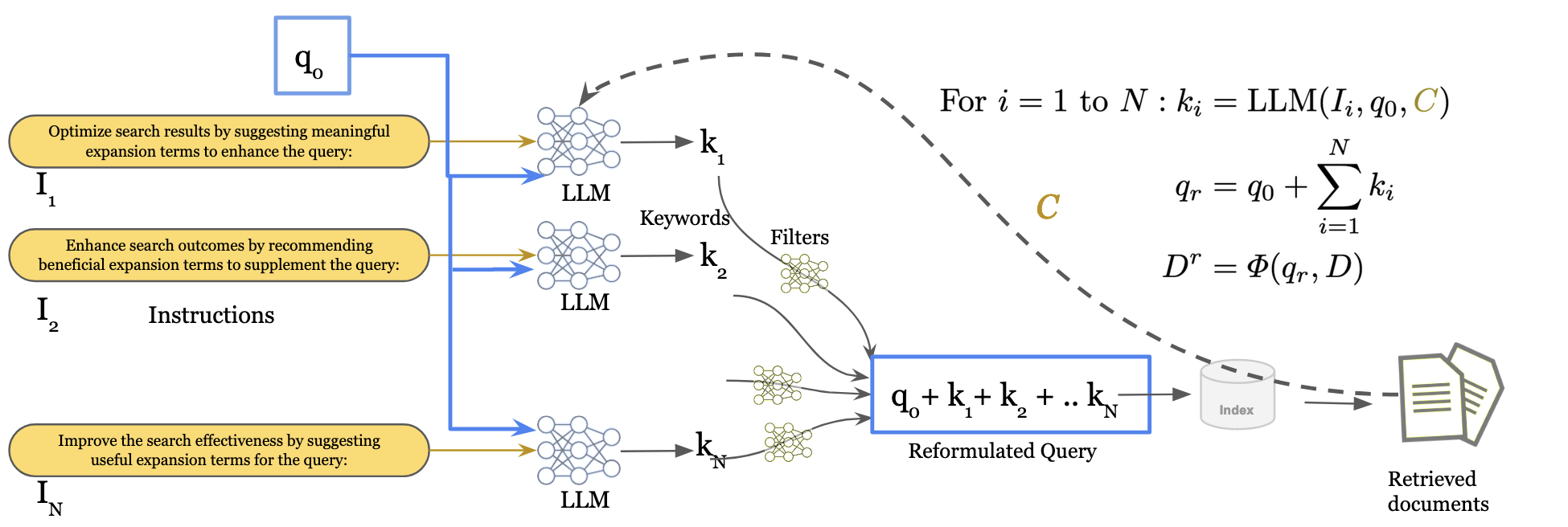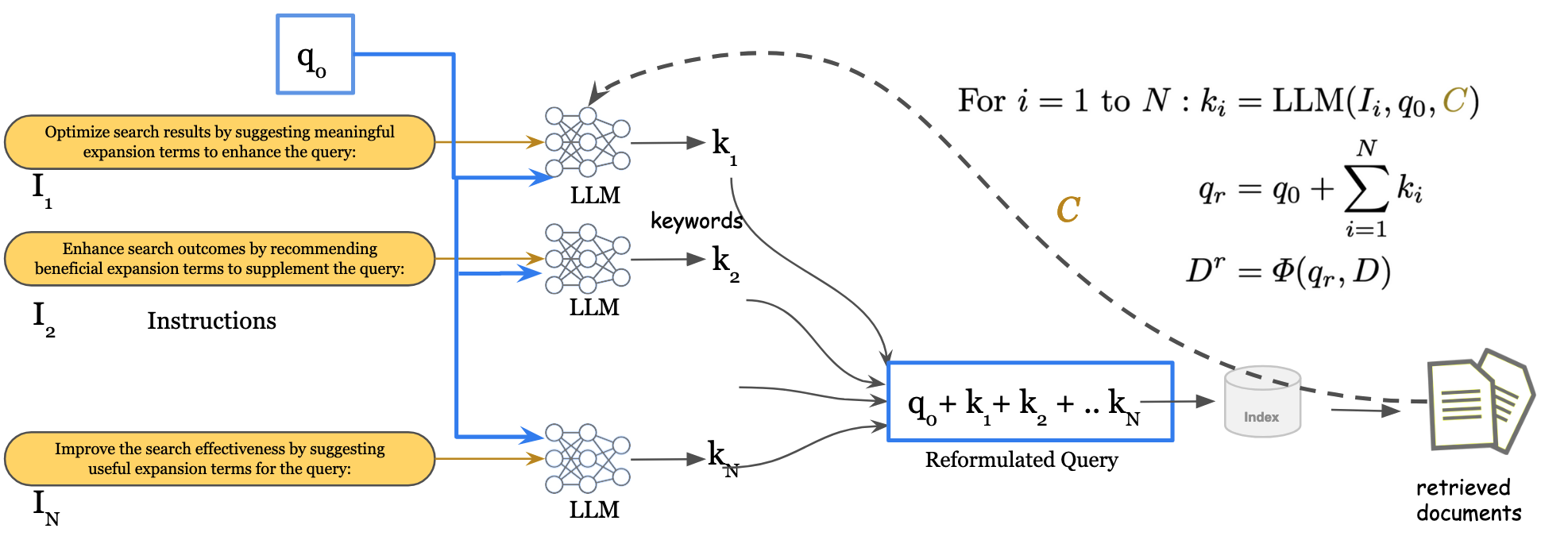GenCRF: Generative Clustering and Reformulation Framework for Enhanced Intent-Driven Information Retrieval

0

Sign in to get full access
Overview
- The paper proposes a novel framework called GenCRF (Generative Clustering and Reformulation Framework) for intent-driven information retrieval.
- It combines generative clustering and query reformulation to enhance the user's search experience.
- The framework learns user intent from search queries and reformulates queries to better match the user's information needs.
Plain English Explanation
The paper presents a new system called GenCRF that aims to improve how people search for information online. The key idea is to better understand the user's goal or "intent" when they perform a search.
Rather than just matching the user's search query to relevant documents, GenCRF tries to cluster similar queries together and then reformulate the query to better reflect the user's underlying intent. This helps surface more relevant and useful information for the user.
For example, if someone searches for "symptom of flu," the system might recognize that they are looking for medical information and reformulate the query to something like "flu symptoms treatment." This would provide more helpful results compared to just matching the original query.
The core idea is to go beyond just matching keywords to truly understand the user's information need and then find the best way to satisfy that need, even if the original query wasn't perfect. This can lead to a much better search experience for the user.
Technical Explanation
The GenCRF framework consists of two main components:
-
Generative Clustering: This part of the system groups similar search queries together using a generative model. The model learns patterns in the queries and clusters them based on inferred user intent.
-
Query Reformulation: Based on the inferred user intent from the clustering step, GenCRF then reformulates the original query to better match the user's information needs. This is done using a generative language model that generates new query variations.
The authors evaluated GenCRF on several benchmark information retrieval datasets. They found that it outperformed standard retrieval models as well as other state-of-the-art query reformulation approaches. The framework was particularly effective at helping users find relevant information for more complex, intent-driven queries.
Critical Analysis
The GenCRF framework represents an interesting and promising approach to enhancing information retrieval. By modeling user intent and reformulating queries, it aims to go beyond simple keyword matching to truly understand the user's information needs.
However, the paper does not dive deeply into potential limitations or caveats of the approach. For example, the clustering and reformulation models could be susceptible to biases in the training data, leading to suboptimal performance for certain types of queries or user intents.
Additionally, the evaluation was done on standard benchmark datasets, so it's unclear how well the framework would generalize to real-world search scenarios with noisy, ambiguous, or domain-specific queries. Further research may be needed to stress-test the robustness and scalability of the approach.
Overall, the GenCRF framework is an innovative contribution to the field of intent-driven information retrieval. But as with any new model or technique, there are likely areas for improvement and further refinement based on additional research and real-world testing.
Conclusion
The GenCRF framework proposed in this paper represents an exciting step forward in enhancing the user experience for information retrieval. By modeling user intent and reformulating queries accordingly, the system aims to provide more relevant and useful results compared to traditional keyword-based approaches.
While the technical evaluation shows promising results, there are likely areas for further improvement and research. Nonetheless, the core ideas behind GenCRF – leveraging generative models to deeply understand user intent and reformulate queries accordingly – could have significant implications for the future of search and information discovery on the internet.
This summary was produced with help from an AI and may contain inaccuracies - check out the links to read the original source documents!
Related Papers


0
GenCRF: Generative Clustering and Reformulation Framework for Enhanced Intent-Driven Information Retrieval
Wonduk Seo, Haojie Zhang, Yueyang Zhang, Changhao Zhang, Songyao Duan, Lixin Su, Daiting Shi, Jiashu Zhao, Dawei Yin
Query reformulation is a well-known problem in Information Retrieval (IR) aimed at enhancing single search successful completion rate by automatically modifying user's input query. Recent methods leverage Large Language Models (LLMs) to improve query reformulation, but often generate limited and redundant expansions, potentially constraining their effectiveness in capturing diverse intents. In this paper, we propose GenCRF: a Generative Clustering and Reformulation Framework to capture diverse intentions adaptively based on multiple differentiated, well-generated queries in the retrieval phase for the first time. GenCRF leverages LLMs to generate variable queries from the initial query using customized prompts, then clusters them into groups to distinctly represent diverse intents. Furthermore, the framework explores to combine diverse intents query with innovative weighted aggregation strategies to optimize retrieval performance and crucially integrates a novel Query Evaluation Rewarding Model (QERM) to refine the process through feedback loops. Empirical experiments on the BEIR benchmark demonstrate that GenCRF achieves state-of-the-art performance, surpassing previous query reformulation SOTAs by up to 12% on nDCG@10. These techniques can be adapted to various LLMs, significantly boosting retriever performance and advancing the field of Information Retrieval.
Read more9/18/2024


0
Generative Query Reformulation Using Ensemble Prompting, Document Fusion, and Relevance Feedback
Kaustubh D. Dhole, Ramraj Chandradevan, Eugene Agichtein
Query Reformulation (QR) is a set of techniques used to transform a user's original search query to a text that better aligns with the user's intent and improves their search experience. Recently, zero-shot QR has been a promising approach due to its ability to exploit knowledge inherent in large language models. Inspired by the success of ensemble prompting strategies which have benefited other tasks, we investigate if they can improve query reformulation. In this context, we propose two ensemble-based prompting techniques, GenQREnsemble and GenQRFusion which leverage paraphrases of a zero-shot instruction to generate multiple sets of keywords to improve retrieval performance ultimately. We further introduce their post-retrieval variants to incorporate relevance feedback from a variety of sources, including an oracle simulating a human user and a critic LLM. We demonstrate that an ensemble of query reformulations can improve retrieval effectiveness by up to 18% on nDCG@10 in pre-retrieval settings and 9% on post-retrieval settings on multiple benchmarks, outperforming all previously reported SOTA results. We perform subsequent analyses to investigate the effects of feedback documents, incorporate domain-specific instructions, filter reformulations, and generate fluent reformulations that might be more beneficial to human searchers. Together, the techniques and the results presented in this paper establish a new state of the art in automated query reformulation for retrieval and suggest promising directions for future research.
Read more5/29/2024


0
GenQREnsemble: Zero-Shot LLM Ensemble Prompting for Generative Query Reformulation
Kaustubh Dhole, Eugene Agichtein
Query Reformulation(QR) is a set of techniques used to transform a user's original search query to a text that better aligns with the user's intent and improves their search experience. Recently, zero-shot QR has been shown to be a promising approach due to its ability to exploit knowledge inherent in large language models. By taking inspiration from the success of ensemble prompting strategies which have benefited many tasks, we investigate if they can help improve query reformulation. In this context, we propose an ensemble based prompting technique, GenQREnsemble which leverages paraphrases of a zero-shot instruction to generate multiple sets of keywords ultimately improving retrieval performance. We further introduce its post-retrieval variant, GenQREnsembleRF to incorporate pseudo relevant feedback. On evaluations over four IR benchmarks, we find that GenQREnsemble generates better reformulations with relative nDCG@10 improvements up to 18% and MAP improvements upto 24% over the previous zero-shot state-of-art. On the MSMarco Passage Ranking task, GenQREnsembleRF shows relative gains of 5% MRR using pseudo-relevance feedback, and 9% nDCG@10 using relevant feedback documents.
Read more4/8/2024


0
A Survey of Generative Information Retrieval
Tzu-Lin Kuo, Tzu-Wei Chiu, Tzung-Sheng Lin, Sheng-Yang Wu, Chao-Wei Huang, Yun-Nung Chen
Generative Retrieval (GR) is an emerging paradigm in information retrieval that leverages generative models to directly map queries to relevant document identifiers (DocIDs) without the need for traditional query processing or document reranking. This survey provides a comprehensive overview of GR, highlighting key developments, indexing and retrieval strategies, and challenges. We discuss various document identifier strategies, including numerical and string-based identifiers, and explore different document representation methods. Our primary contribution lies in outlining future research directions that could profoundly impact the field: improving the quality of query generation, exploring learnable document identifiers, enhancing scalability, and integrating GR with multi-task learning frameworks. By examining state-of-the-art GR techniques and their applications, this survey aims to provide a foundational understanding of GR and inspire further innovations in this transformative approach to information retrieval. We also make the complementary materials such as paper collection publicly available at https://github.com/MiuLab/GenIR-Survey/
Read more6/5/2024